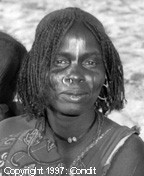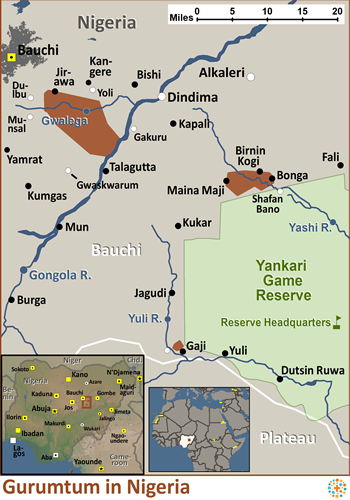The Guruntum claim to have migrated from an area called Miri, located southwest of Bauchi. From there, they moved to Kuku then eventually settled in their present-day location. The Guruntum live in Bauchi state in Nigeria, in Bauchi and Alkaleri districts. Because of intermarriage with the larger Jarawa group, the Guruntum are considered to be a Jarawa sub-group. They speak a Chadic language, with Hausa being spoken as a secondary language.
Containing many hills and mountains as well as numerous rivers and streams, this area is ideally suited for agriculture. The Guruntum people rely on farming and raising livestock for their livelihood. Their principal crops are guinea corn, millet and yams. They also grow a variety of vegetables, and women often tend to their own plots of land. The Guruntum live in compact villages protected by hedges or walls. Grouped in enclosed family compounds, huts are round with conical thatched roofs and mud walls. Each village has a headman, who handles affairs and makes decisions at the local level. The chief over all the Guruntum is elected from the Kasis clan, the royal family of the Guruntum. Groups of boys between the ages of seven and nine are circumcised together. They are taken to the bush for a month, where elders and the dodo (masked occult figure) initiate the boys into the religious life of their people. This time is also a training period for manhood. When the month is completed, they hold a seven-day feast; and the boys are brought back to their parents by the dodo, who dances with people in the village upon their return. Most Guruntum marriages are arranged by the parents. A woman from the boy's village will take a bangle to the girl's house and fasten it on the girl's wrist. The girl cannot refuse this, as it is a symbol of the couple's engagement to be married. When the girl reaches marriageable age, the boy's parents bring gifts to the girl's family, and the two become husband and wife. Polygamy is considered prestigious; thus, many Guruntum men, if they can afford it, will have more than one wife. When a woman gives birth to her first child, she remains in her husband's house until the seventh day after birth, at which time there is a naming ceremony. The woman and child are taken to the woman's father's house where they will remain for two years. This is done as a means of birth control. The Guruntum are somewhat modernized compared to their African neighbors. They desire that their children attend school; however, most people cannot afford to pay the school fees. Although modern medical facilities are not always available to them, the Guruntum prefer modern medical care to their traditional practices in medicine.
The majority of the Guruntum are ethnic religionists, following their traditional beliefs. Islam, however, is beginning to gain a foothold in their region, and a majority of them identify with the Islamic religion though they regularly practice their ethnic religion. They worship Wari, their supreme god through smaller gods called Kwanams. During festivals in the villages, the Kwanams will appear as masked figures, dancing with the people. Although Wari is considered a good god, his role is not very distinct, since the lesser gods take care of all the needs of the people. They consider rain, lightning, and other natural forces to be gods. They believe that an individual can be possessed by such forces and can have power over these forces.
There are a small number of believers among them, but Islam is a powerful force to be reckoned with. The Guruntum need the opportunity to hear and embrace the gospel.
Pray that the Lord will show himself powerful by providing abundant rain and an excellent harvest for the Guruntum people. Pray for the Lord to thrust out faithful Holy Spirit anointed workers to the Guruntum people of Nigeria. Pray for a massive movement to Christ that will transform their communities. Pray for spiritual hunger for truth and righteousness for Guruntum elders.
Scripture Prayers for the Gurumtum in Nigeria.
| Profile Source: Joshua Project |

























